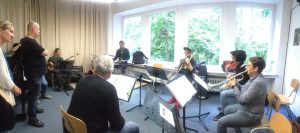Band practise at Neue Jazzschool, 6 Oct 2016
Jyväskylä and Kainuu Colleges joined forces a few years ago to seek high-quality possibilities for mobility for both students and staff in music education on VET level. The task was not easy. During the first year of research, the conclusion was that many European countries did not have VET level education in music and if they did, they did not have interest in mobility or European cooperation. After the education providers that were interested and seemed to have the same kind of needs had been identified, the network partners met for the first time in Slovenia in spring 2015. The meeting was hosted by Ljubljana Music and Ballet Conservatory and the first steps to the network cooperation were taken there.
Since that first meeting the partners have come together three times: autumn 2015 (London, UK), spring 2016 (Arnhem, NL) and recently at Neue Jazzschool in Munich. Jyväskylä College was represented at the meeting by teachers Suvi Uura and Markku Rinta-Pollari and International Coordinator Rea Tuominen.
During the meeting in Munich the partners continued to work on an Erasmus+ KA2 project proposal that will be submitted in the beginning of 2017. The key themes of the project are linked to A New Skills Agenda for Europe which was published on 10 June 2016. Its focus is on equipping Europeans with the right skills in order to increase Europe’s workforce employability and to respond to changes in labour market requirements. The need for the agenda is based on the analysis that currently there is, across all sectors, a shortage of basic, digital, transversal, and entrepreneurial skills.
According to CIGN (Creative Industries Global Network, http://www.cign-education.eu/) creativity is increasingly perceived as a strategic driver for economic growth and a real asset for improving competitiveness in a knowledge-based economy. The Cultural and Creative Industries (CCIs) are knowledge and labour intensive and foster innovation, so the sector is perceived to have a huge but largely untapped potential for generation of employment and export expansion. Not surprisingly, the creative industry as a whole is recognized as a potential high growth sector in the EU and its member states.
As the culture sector evolves and changes, so do the skills required of individuals active in the sector. The educational and training needs created by these changes can only be met by an education sector that recognises the change in demand. With digital and mobile technologies becoming an increasingly important facet of modern life, it is necessary to ensure that the skills taught in education keep pace.
The pace of innovation, the changing nature of the CCI sector, and the importance of culture to the European economy increasingly mean that many who work in this sector are essentially entrepreneurs and also cultural entrepreneurs need both an entrepreneurial mindset and business skills, which in turn means that educational supply has to keep pace.
CCIs need support to enable them to properly represent their interests and raise their concerns, as well as to create cross-border networks and platforms to help structure and strengthen the sector. Music is inherently an international industry and a successful career in music requires an extensive network beyond local, regional and national borders.
More information: Rea Tuominen (at)jao.fi
